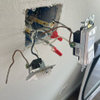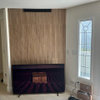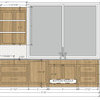cgfi in mwbc situation
orourke
12 years ago
More Discussions
I had been going through all the circuits in my house and replacing the first receptacle in the chain with CGFI for better protection.
However, in my garage I have a MWBC situation, which seems to pose a problem.
You see, in the garage, an MWBC wire carrying two phases (Black+Red+White+Ground) comes down from the attic (I assume) and feeds a 2 gang receptacle with each one of the two receptacles being wired to a different phase. However the problem seems to be that this MWBC wire then CONTINUES (inside the wall) to feed additional 2 gang situations on other walls of my garage - and all these downstream 2 gangs are wired to the MWBC wire exactly the same (that is one separate phase feeds each receptacle, the white neutral is shared)
So seems like it is NOT POSSIBLE to protect this circuit with CGFI because if I replaced the first 2 gang in the chain with CGFIs the white wire would be common downstream and I imagine that would cause the CGFIs to trip on unbalanced current whenever anything was plugged in the downstream 2 gangs (I have not tried it but reading how CGFIs operate I suspected there may be a problem).
Assuming IâÂÂm correct about being unable to use CGFIs in this situation, is there something else I can do to get CGFI protection on this circuit? Or some other method offering similar protection? This is the garage, so I imagine it may be even more important to have some protection.



bus_driver
orourkeOriginal Author
Related Professionals
American Canyon General Contractors · Arlington General Contractors · Clarksville General Contractors · Enfield General Contractors · Merritt Island General Contractors · Olney General Contractors · Rolling Hills Estates General Contractors · Wheaton General Contractors · Danville Solar Energy Systems · Hayward Solar Energy Systems · Englewood Home Automation & Home Media · Libertyville Home Automation & Home Media · Mount Lebanon Home Automation & Home Media · Naperville Home Automation & Home Media · Newtown Square Home Automation & Home MediaRon Natalie
orourkeOriginal Author
kurto
Ron Natalie